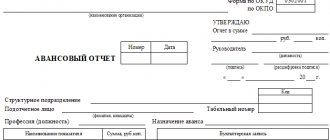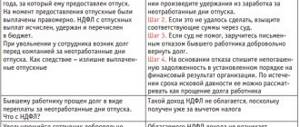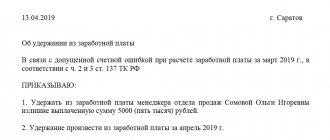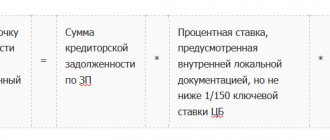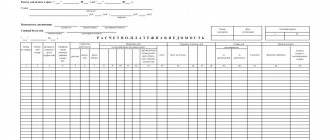Payroll calculation is a labor-intensive and painstaking procedure. Despite the widespread automation of this process, an accountant is not immune from errors. Failures in the operation of computer equipment also occur, which can result in incorrect calculations and overpayment of wages to employees.
Having discovered an error, the accountant often makes an automatic deduction from the next month's accruals based on settlements with the employee, making the appropriate entries in accounting. Is such a “simple” way out of the situation legal? In what cases does an organization have no right to withhold excess wages paid? Is an accountant responsible for errors in payroll calculations? Let's find out in the article.
Is it possible to pay wages to a non-resident through a cash register ?
Returns are not always possible
It should be said right away that “automatic” deductions of amounts overpaid to an employee from the next month’s wages or failure to issue part of the wages in cash from the cash register under the same conditions are illegal.
Resolving an unpleasant situation for an accountant should begin with receiving a statement from the employee, in which he asks to withhold the excess amount of money received or undertakes to pay it in cash voluntarily.
It is possible to do without written consent only in some cases described in the Labor Code of the Russian Federation (Article 137):
- the presence of a counting error, i.e. such an error that can be attributed to arithmetic;
- the calculation was made on the basis of false information received from the employee (for example, false documents for personal income tax deduction);
- the calculation was made on the basis of false information from the primary documents for calculating wages (for example, according to the documents, the production output standard was met, but in fact it was not).
As a rule, such situations, in particular, the submission by an employee of false information that affects the calculation of “salary” amounts, are resolved in court (see the Labor Code of the Russian Federation, the same article).
If the employee has expressed in writing his consent to repay the overpayment, the employer can withhold it only for a month after the end of the period specified for the return of advances, debts, and incorrectly accrued amounts of payments.
How to arrange the release of deposited wages from the cash desk by proxy?
Counting error and judicial practice
The presence of a counting (arithmetic) error is the most common argument of the employer when withholding overpaid amounts of wages. However, judicial practice in this area most often does not work in favor of organizations.
Example: The Moscow Regional Court, in its ruling No. 33-19764 dated 10/12/10, expressed the opinion that an overpayment cannot be a counting error, but is a consequence of the employer’s incorrect application of labor legislation. According to the judges, the overpayment cannot be attributed to the amounts of unjust enrichment (Civil Code of the Russian Federation, Art. 1109). The employee is not obliged to return the funds overpaid to him. In addition, not all courts recognize a malfunction in an accounting program as a counting error.
Example: The Sverdlovsk Regional Court, in its ruling in case No. 33-7642/2016 dated 04/21/16, did not recognize a technical counting error, but the Samara Regional Court in its ruling No. 33-302/2012 dated 01/18/12 did.
Judicial practice on the application of Art. 137 of the Labor Code clearly indicates that the following cannot be recognized as a counting error:
- payment for a longer vacation than the employee is entitled to by law;
- payment of a larger bonus;
- erroneous payment of double wages for the period.
This is evidenced by numerous decisions of courts of all levels, up to and including the Supreme Court (definition No. 59-B11-17 of 01/20/12).
On a note! Rostrud, in its letter No. 3044-6-0 dated 09-08-07, expresses the point of view according to which, even if there is an undeniable accounting error, the employee’s written consent is required to repay the difference at his expense.
Return of overpaid wages to the cash desk – Citizens' rights
/ Salary disputes / Consequences of an error - return of overpaid wages
Sometimes situations occur when an accountant mistakenly pays an employee more wages than expected. Moreover, the reasons can be very different, ranging from the accrual of an extra premium and up to a simple arithmetic miscalculation. However, not in all cases it will be possible to return the overpaid amount.
So, when is this possible, and what does current labor legislation say about this?
Documentation of the return of excess payments
Having discovered an error, the accountant is obliged to report it to the management of the company. Next, an act is drawn up, which records the fact of overpayment, amount, accrual period and other essential information. Members of the commission signing the act may be: accountant, chief accountant, cashier, etc.
The second copy of the document or its copy is sent to the employee in relation to whom the error occurred. An official letter of notification about the need to repay the overpaid amount within a certain period is attached to the act.
If the employee does not object, then, based on his application, the amount is paid in cash or by non-cash deduction from wages on other terms agreed with the administration. Often such repayment occurs in installments. According to Art. 138 of the Labor Code of the Russian Federation, as a general rule, deduction is possible in the amount of no more than 20% of each salary. It should be taken into account that the employee, in addition to the specified amount to be repaid, may have other deductions.
If an employee agrees in writing to repay the debt in cash at the cash desk or voluntarily deposit it into the company’s account, but this period has expired and the debt has not been repaid, then within the next month the manager issues an order to deduct the amount of the debt from the employee’s salary. If the employee ignores the notice or refuses to repay the overpayment, the employer may go to court.
The issue with an employee who, upon dismissal, received more than what was required by law, is resolved in the same manner as indicated above. It is advisable to immediately indicate in the notice the possibility of going to court if the debt is not repaid. Dismissed employees in most cases refuse to voluntarily repay overpayments.
How to formalize and reflect in accounting the return to the cash desk of wages overpaid to an employee?
Recalculation after dismissal
Even if the employee in whose favor the excess payment was made quits, the employer still has the right to recover the amount of the overpayment from him. However, some difficulties may arise here. In particular, if a former employee left the country, the return of overpaid wages may be significantly delayed or may not occur at all.
The employer has three options:
- You can contact the dismissed employee and try to negotiate with him about a voluntary return of funds.
- Contact the judicial authorities with the appropriate statement of claim. This option is relevant if the employee categorically does not want to make contact.
- The employer can simply write off the resulting debt as expenses of the organization.
In this case, in any case, it will be necessary to draw up a report on the identified error, as well as send a notification to the former employee that he is in debt (in the first and second options).
Employee actions
After receiving a notice of the need to return overpaid funds, the former employee can take one of the following paths :
- Report to your previous place of work and voluntarily deposit the overpayment amount into the cash register;
- Refuse refund. However, in this case, you should be prepared for the former employer to sue. Moreover, if his claim is satisfied, then in addition to the return of overpaid wages, he will have to compensate for all legal expenses.
Accountant's responsibility
An accountant may be held financially liable under the law if it was not possible to repay the overpayment at the expense of the employee. The basis for holding the accountant accountable can be an act recording (Labor Code of the Russian Federation, Article 247):
- the amount of material damage;
- the reason for the loss.
The amount of loss can be repaid by an accountant in two ways:
- if there is a liability agreement with him, repayment occurs in full;
- if there is no contract of liability, repayment occurs in the amount of average monthly labor payments (Labor Code of the Russian Federation, Articles 244, 248).
If the accountant does not agree to repay the amount of the error voluntarily or the month period discussed above has expired, the issue of collection is decided exclusively by the court.
On a note! The full financial responsibility of an accountant can be fixed in an employment contract with him.
Postings
If you discover an overcharged and overpaid amount, you should remember that part of this amount is income tax. Thus, the excess payment is “split” into two independent amounts and reflected in different entries.
First, the overpayment as a whole is reversed, using the same entries by which it was accrued: Dt20, 23, 26 Kt70 - reversal for the amount of the overpayment (payments to the Funds for overpayment are similarly reversed).
Then personal income tax is reversed: Dt70 Kt68/NDFL – reversal from the overpayment amount (13%).
The remaining amount overpaid to the employee is reflected in account 73 with the opening of the corresponding sub-account: Dt 73 Kt 70.
The employee voluntarily pays off the debt by depositing funds into the cash register or by deducting from the salary. It is also possible to deposit funds into the company's current account: Dt50,51,70 Kt73.
If for some reason the debt cannot be collected, then the following entries are made:
- Dt76 Kt 73;
- Dt 91/2 Kt 76.
When are deductions possible?
Article 137 of the Labor Code of the Russian Federation provides for the possibility of making a deduction from a subordinate’s salary in the presence of certain circumstances. There are types of deductions:
- mandatory
- by employer's decision
- by agreement between employer and employee
The mandatory ones include the following:
- income tax
- carried out on the basis of executive documents
Deductions decided by the employer include:
Calculation of deductions
- return of an advance payment provided to a subordinate on account of his salary
- collection of the amount of the advance received by the worker, which was not spent and returned within the proper period, paid for sending on a business trip, transfer to another locality to perform work duties, and in other circumstances
- retention of excess funds given to an employee due to an error in calculations
- refund in the case when a specialist quits before the end of the working year, for which he was provided with rest in the form of vacation, according to the number of unworked days
- recovery of a sum of money in favor of the employer for material damage caused by the employee
Results
- Excess accruals and wage payments can be returned to the organization without any problems only with the written consent of the employee in respect of whom the overpayment was made, and only if the one-month period is observed after the one set for the employee to voluntarily repay.
- In other cases, the return may be contested, including in court, despite the legally established possibility of debt repayment. A detected error in payments must be recorded in an act signed by the organization’s internal commission. The employee must be familiarized with the act.
- An accountant who makes a mistake bears financial responsibility for it in accordance with the law.
- Correspondence accounts used to account for overpayments of wages are reversal entries of previously made entries. The excess amount paid in hand is reflected in Dt 73 account. Its repayment by the employee is reflected in the Dt of the corresponding accounts, depending on the method of repayment. If the loss cannot be recovered, it is transferred to Dt 76 and then recorded according to Dt 91/2.
Error caused by an employee
It should be noted that excessively accrued and paid wages are regarded as material damage caused to the employer. In this regard, the management of the organization has every right to recover the amount of overpayment from the accountant who made a mistake (Article 238 of the Labor Code of the Russian Federation).
An important role is played by the agreement on full financial responsibility concluded with the employee who made the mistake. In this case, the employer will be able to withhold the full amount of damage. However, in accordance with Resolution of the Ministry of Labor of the Russian Federation dated December 31, 2002 No. 85, such an agreement can only be concluded with a cashier.
If the overpayment occurred due to the fault of the accountant, then he will bear financial responsibility only within the framework of his average monthly salary (Article 241 of the Labor Code of the Russian Federation).
How to collect wages from an accountant?
So, the recovery of overpaid wages from the guilty person is carried out as follows:
- First, by order of the general director, a commission is appointed that identifies the cause and amount of the overpayment.
- Then the accountant must write an explanatory note addressed to the head of the organization.
- Next, a report is drawn up about the mistake made when calculating wages.
- An order is issued to withhold the amount of overpayment from the accountant through whose fault the error was made.
- The guilty person compensates for the damage caused.
